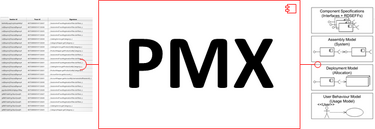PMX
Update: This tool is no longer maintained and supported.
Performance Model eXtractor
The manual creation of architectural performance models is very complex, time intense and error prone. The Performance Model eXtractor (PMX) tool automates the extraction of architectural performance models form measurement data. Currently, PMX supports logs of the Kieker Monitoring Framework as input data format. PMX separates the learning of generic aspects from model creation and is able to extract models of different formalisms. Currently there are builder implementations for Palladio Component Model and Descartes Modeling Language. More information can be found on the following pages:
- Download (eclipse update site and standalone archive)
- source code
- License
If you have any questions, please contact Jürgen Walter.
Mailing List
To stay updated on our tools, please subscribe to our descartes-tools mailing list (low traffic, only announcements related to our tools)
Publications
-
Automation in Software Performance Engineering Based on a Declarative Specification of Concerns. Thesis; Universität Würzburg. (2019).
-
Tools for Declarative Performance Engineering. in Companion of the 2018 ACM/SPEC International Conference on Performance Engineering (2018). 53–56.
-
Providing Model-Extraction-as-a-Service for Architectural Performance Models. in Proceedings of the 2017 Symposium on Software Performance (SSP) (2017).
-
Mapping of Service Level Objectives to Performance Queries. in Proceedings of the 2017 Workshop on Challenges in Performance Methods for Software Development (WOSP-C’17) co-located with 8th ACM/SPEC International Conference on Performance Engineering (ICPE 2017) (2017).
-
An Expandable Extraction Framework for Architectural Performance Models. in Proceedings of the 3rd International Workshop on Quality-Aware DevOps (QUDOS’17) (2017).
-
Online Learning of Run-time Models for Performance and Resource Management in Data Centers. in Self-Aware Computing Systems, S. Kounev, J. O. Kephart, A. Milenkoski, X. Zhu (Hrsg.) (2017).
-
CASPA: A Platform for Comparability of Architecture-based Software Performance Engineering Approaches. in Proceedings of the 2017 IEEE International Conference on Software Architecture (ICSA 2017) (2017).
-
Automation and Simplification Through Declarative Performance Engineering. (2016, Juni).
-
Leistung von IT-Systemen vorhersagen. (2015, Dezember). 1–2.



